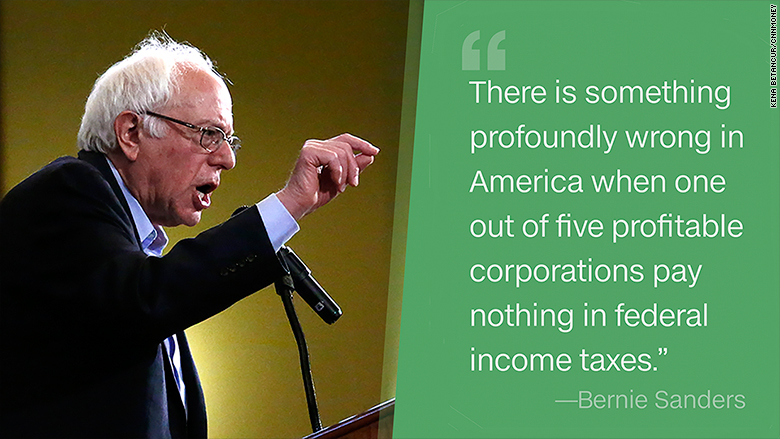
Nearly 20% of large U.S. corporations that reported a profit on their financial statements in 2012 ended up paying exactly nothing in U.S. corporate income taxes.
As in zero, zilch, zip, nada.
That's according to a new report from the Government Accountability Office, which conducted its analysis at the behest of Senator Bernie Sanders, a vocal critic of corporate America.
Prior to 2012, the GAO estimated that 24% of profitable large corporations owed no income tax in 2011, 22% owed nothing in 2010 and 21% owed nothing in 2009.
How can profitable companies end up with a $0 corporate income tax bill? There could be a few reasons, according to the GAO.
Among them, they may get a lot of tax deductions for losses they had in previous years but carried forward. They also may be able to write off more for depreciating assets than they have to claim on their financial statements. Or, if they made profits offshore and haven't brought them back to the United States, they would not owe U.S. tax on them until they do.
"There is something profoundly wrong in America when one out of five profitable corporations pay nothing in federal income taxes," Sanders said. "We need real tax reform to ensure that the most profitable corporations in America pay their fair share in taxes. That means closing corporate tax loopholes to raise the revenue necessary to rebuild America and create millions of jobs."

Related: 7 things you must know about corporate taxes
But most large corporations -- and about a third of small corporations -- did owe corporate income taxes that year, to the tune of nearly $268 billion. For tax years 2008 through 2012, large profitable companies paid, on average, about 14% of their pretax income in U.S. corporate income taxes, or 22% once foreign, state and local taxes are included. That's well below the 35% top corporate income tax rate.
The GAO conducted its analysis using anonymous corporate tax data from the IRS, and information from a form that large companies must fill out to reconcile the amounts of income and expenses they report for financial statement purposes with those they report for tax purposes. GAO researchers also interviewed IRS officials and various experts.
Broadly speaking, however, unless one has a company's actual tax returns in hand, it's impossible to say exactly what a given company paid in corporate income taxes. And even then it may be hard to unpack given both the complexity of corporate accounting and a byzantine corporate tax code.
Related: Sanders: JPMorgan and GE 'destroying the moral fabric' of the country
Most lawmakers agree that the corporate tax code needs to be reformed. But they don't yet agree on how to do that, or on how the money raised should be used.
At a press conference Wednesday, Sanders said he wants to close corporate "loopholes" that benefit U.S. multinationals and use the money raised to invest in infrastructure.
In the meantime, the U.S. Treasury Department recently introduced a third set of guidelines intended to crack down on corporate tax avoidance among U.S. multinationals, especially those seeking to merge with foreign companies and take advantage of loopholes that let them reduce their U.S. tax bill.
